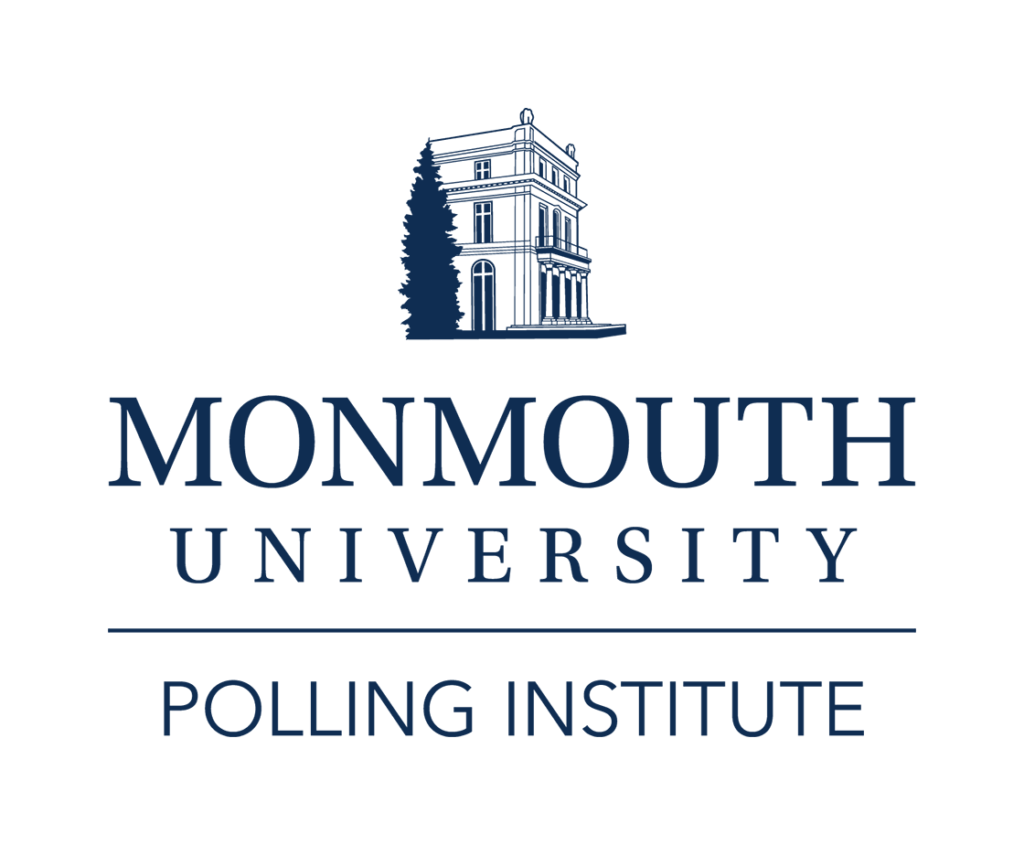During this past fall’s campaign for governor, the Monmouth University Polling Institute tracked the opinions of a panel of 999 New Jersey voters. In the weeks following Chris Christie’s victory over Jon Corzine, the Polling Institute re-contacted 481 of these voters to get their reactions to the result and their expectations for the new administration.
The Initial Reaction
Just as the final vote tally was divided (48.5% for Christie to 44.9% for Corzine, with 5.8% for independent Chris Daggett and 0.9% for other candidates), so too was the electorate’s reaction. Voters in our online panel were asked to enter the one word that described their feelings about the outcome of this election. The “word cloud” below illustrates their split opinion.
The top words were “disappointed,” “hopeful,” and “relieved.” As may be expected, those who did not support Chris Christie’s candidacy were disappointed, while Christie voters divided their reactions between hope and relief.
The choice of words reveals some interesting aspects about the mood of the electorate and has implications for how the public will greet the incoming Christie administration.
“While many Corzine supporters were disappointed over his loss, few used more emotional terms like disgust or dismay. Most seemed resigned to the fact that New Jersey was going to have a change in government,” said Patrick Murray, director of the Monmouth University Polling Institute. “On the other hand, only a small number of Christie voters said they were actually elated by the outcome. Instead, the hope and relief expressed by these voters seems more indicative of a weary electorate who feel Christie’s victory is just the first step in getting New Jersey back on the right track.”
Murray added, “Christie’s supporters may not expect political miracles in the first year of his term, but they do insist on seeing progress in a few key areas.”
The Voters’ Agenda
The survey asked the panel of voters to name the first thing they would like Governor-elect Christie to do when he takes office on January 19th. The results show that taxes and spending head the list of expectations. Among all voters in the panel, about 1-in-4 (23%) named cutting taxes as the first issue Christie needs to address, with about one third of that group specifying property taxes as the main problem. Another one-in-five (20%) say that state spending needs to be reined in. Other prime targets for the new administration are spurring job growth in the state (10%), dealing with unionized state worker and teacher pay and benefits (8%), and fixing corruption in government (7%).
First Thing Christie Should Do | All Voters | Christie Voters | Independent Christie Voters |
|
|
|
| |
|
Cut taxes |
23% |
25% |
22% |
|
— Property taxes |
8% |
8% |
9% |
|
— Taxes in general |
15% |
17% |
13% |
|
|
|
| |
|
Cut state spending |
20% |
27% |
27% |
|
— Spending in general |
11% |
15% |
15% |
|
— Waste in budget |
6% |
8% |
7% |
|
— Size of government |
3% |
4% |
5% |
|
|
|
| |
|
Spur job growth |
10% |
12% |
14% |
|
|
|
| |
|
Deal with salaries, pensions, unions, teachers |
8% |
12% |
13% |
|
|
|
| |
|
Address corruption, ethics |
7% |
11% |
9% |
|
|
|
|
|
Among Christie’s own voters, cutting taxes (25%) and spending (27%) are about as equally important, with jobs (12%), state salaries and benefits (12%), and corruption (12%) registering as second tier concerns.
“Rudy Giuliani famously noted that he ran for mayor of New York on a platform of fighting crime and knew that regardless of what other accomplishments he may have in his first term, he would not be re-elected unless voters saw crime improve,” said Murray. “Chris Christie appears to have a two-fold acid test with New Jersey voters. He has to cut both taxes and spending. That’s a tall order when times are good. It’ll be an exceptionally formidable task in the current economic climate.”
Murray added, “It may be possible that Christie’s own supporters will stick with him if he doesn’t make much progress on the tax issue, as long as he reduces the size of government. It’s important to remember, though, that Christie’s victory was due largely to voter frustration with the past few administrations. A job adequately done may not be enough. It is likely that Christie will have to win over some of his opponents’ supporters if he expects to be re-elected in 2013. And that probably means cutting taxes, especially property taxes.”
The survey also asked voters to name the one negative thing they are most worried will happen in New Jersey government under a Christie administration. Among Christie’s own supporters a key concern is that taxes will remain high, or perhaps go even higher. According to Bill, a participant in the voter panel who was more an “anybody but Corzine” voter than a Christie enthusiast, “It is like a snowball rolling downhill and no one person or administration will be able to save it.”
The other major concern among voters who put Christie into office is that the new administration will get absorbed by “the Trenton blob” despite good intentions. As David, an independent from Ocean County who voted for Christie, put it, his worst fear is that the incoming administration will be “business as usual, just a new name running it.” Others worry specifically that Christie’s efforts will be stymied by partisanship. Carolyn, a Republican from Morris County wrote that she is “not so much worried about how New Jersey will be governed, but how the [Democratically-controlled] legislature will block the changes we need to make in favor of special interests.”
Voters who supported Jon Corzine or one of the independent candidates share the fears of Christie voters that taxes will remain high or go even higher during the next four years. But they are also concerned that potential cuts in spending that could negatively affect education, urban areas, and other programs. Tom, an Essex Democratic is worried that “excessive tax cuts, especially for the wealthy, [will lead] to deterioration of services and more problems for local governments.” And some of these voters worry, like William of Monmouth County, that “Christie will cater to the right wing of the Republican Party waaaaay [sic] too much.”
Poll director Patrick Murray noted, “Whether they supported him in November or not, New Jersey voters are worried that Chris Christie may not be able to do much in the end to ease the state’s tax burden. It’s also clear that independent voters, who were crucial to his electoral success, expect to see real change in how fiscal decisions are made in New Jersey. Chris Christie finds himself in an interesting position. The public is skeptical that real change is obtainable. Yet, the new governor will be judged on whether he can affect that change.”
A Final Look Back at How New Jersey Voted
Chris Christie built his 3.6 point victory margin on strong turnout from Republican partisans and an unprecedented 2-to-1 level of support among the state’s Democratically-inclined independent voters. The question is whether he will be able to hold on to that support without the anger against a Democratic incumbent that won him his first term.
One key to holding on to his winning coalition is whether he will have to deal with a viable – or at least headline-grabbing – independent candidate. The candidacy of Chris Daggett garnered attention last year when he qualified for inclusion in the state-sanctioned candidate debates. His profile was boosted in late September when he unveiled a plan to reduce property taxes.
In the end, Daggett barely scraped to 6% of the vote. However, he had been polling in double digits in early October. Our panel study found that voters who were leaning toward either Chris Christie or Jon Corzine by late September eventually followed through on that intent. However, those who flirted with a Chris Daggett vote were unlikely to pull the trigger when they got into the voting booth.
Specifically, the panel tracked what voters said their intention was in September and October and compared it to how they actually voted in November. If someone said they were undecided and only leaning toward a candidate in the run-up to Election Day, their choice, no matter how “soft,” was counted as a vote intent for that candidate. By mid-October, more than one-quarter (27%) of the panel said that they still had not made up their minds. However, very few actually changed their final vote choice.
Overall, 98% of panel participants who indicated some level of support or inclination for Chris Christie by late-September ended up voting for him. Among those who intended to vote for or leaned toward Jon Corzine last fall, 92% stuck with him, even though some said they were not firm in their choice. On the other hand, only 39% of those who considered voting for Chris Daggett actually followed through with that choice on Election Day.
Murray stated, “These findings suggest that there really are very few truly undecided voters a month before a high profile election. A number of voters claim that they are barely leaning toward a candidate or could change their mind. In reality, very few stray from their initial inclination. The only wildcard in this dynamic is the presence of an independent candidate, whose support is more fragile. But in a typical two-person race, it’s likely that nearly all voters know who they are going to vote for at least a month ahead of time, whether or not they admit it to pollsters or indeed to themselves.”
An independent candidate can have an impact, and may have done so in this race. The panel study found that the lion’s share – more than 80% – of Daggett’s lost support eventually went to Christie. If Daggett had held on to his initial voter support in the same proportion as the major party candidates did, the study suggests that the eventual outcome could have been different, with perhaps a slim one point victory for the incumbent (43% Corzine, 42% Christie, 14% Daggett).
Panel Methodology: The panel was conducted using an online internet survey. Email addresses for likely voters were obtained from past participants of Monmouth University polls and a purchased list of voter records. The first round of interviews took place September 23-28 (Wave 1), the second round October 9-14 (Wave 2), and the third round November 6-17 (Wave 3). The intention of this panel study was to track individual level change over the course of the fall campaign. It should not be construed as being statistically representative of all voters who participated in the 2009 election for governor. The results discussed in this report are valid only for those groups of voters who participated in the panel study.
Click on pdf file link below for full methodology and results by key demographic groups.




